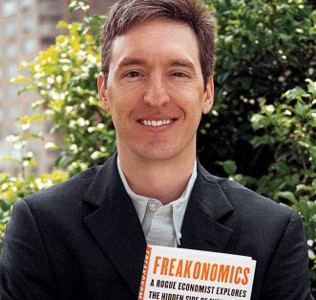
See more

Who do people mostly admire?
Most Admired Man and Woman20202019%%Bernie Sanders11Bill Gates12LeBron James1*39 more rows
Who produces Freakonomics podcast?
The show is also distributed as a podcast, and is among the most popular on iTunes. Created in September 2010, it is a weekly podcast. From July 2018, production moved from WNYC to Stitcher Radio; Alison Craiglow is the Executive Producer. The staff of Freakonomics Radio includes Greg Rippin and Harry Huggins.
What genre is Freakonomics?
Non-fictionFreakonomics / GenreNonfiction is any document or media content that attempts, in good faith, to provide accurate information regarding a real-world topic. Nonfictional content may be presented either objectively or subjectively. Wikipedia
Who is freakonomics written by?
Steven LevittStephen J. DubnerFreakonomics/Authors
Is Freakonomics podcast free?
You want to listen to Freakonomics Radio? That's great! Most people use a podcast app on their smartphone. It's free (with the purchase of a phone, of course).
How popular is Freakonomics podcast?
Freakonomics Radio is one of the most enduring and popular podcasts in the world, with over 10 million listeners per month and an archive going back 10 years. No Stupid Questions launched in May of 2020 and has already had two million downloads. People I (Mostly) Admire launched in August of 2020.
Is Freakonomics appropriate for high school?
Like Common Sense said, too complex for young kids So, I don't think there are any major issues (Kijkwijzer (the Dutch ratings agency) rates it as safe for all ages), though if you have a very sensitive kid, murder and abortion are mentioned, but I suspect most kids under 9 are likely to be quite bored with the movie.
Is Freakonomics a good book?
I found this book to be very insightful, and a book that can be read over and over again. You can recommend this book to your peers or even your teacher, as this book is a great read. A book that I learned much from, and will never forget.
Can you bribe a 9th grader to succeed?
This is important because if one stays focused on “incentives”, it would be easy to see the conclusion of this segment as, simply, “No, a ninth grader cannot be bribed to succeed”. While a fair answer, it is also one that misses the complexities of the story told by Ewing and Grady.
What is the overall message of Freakonomics?
1-Sentence-Summary: Freakonomics helps you make better decisions by showing you how your life is dominated by incentives, how to close information asymmetries between you and the experts that exploit you and how to really tell the difference between causation and correlation.
What does Freakonomics have to do with economics?
Overview. The book is a collection of articles written by Levitt, an expert who had gained a reputation for applying economic theory to diverse subjects not usually covered by "traditional" economists. In Freakonomics, Levitt and Dubner argue that economics is, at root, the study of incentives.
How old is Steven Dubner?
58 years (August 26, 1963)Stephen J. Dubner / Age
Who is Steve Levitt?
As a thinly-veiled ploy to improve his own game, Steve talks to two titans of the sport: Greg “The Shark” Norman , who was the world’s top-ranked golfer for more than six years; and Mark Broadie, a Columbia professor whose data analysis changed how pros play the game.
What did Steve Levitt talk about?
But things haven’t always come easily for him. Steve Levitt talks to Kwon about his debilitating childhood anxieties, his compulsion to choose the hardest path in life, and how Kwon used his obsession with game theory to stage a come-from-behind victory on Survivor.
Where does Tim Harford live?
Tim Harford lives in England, where he’s made it his mission to help the public understand statistics. In their conversation, Steve gives Tim some feedback on his new book, The Data Detective, contemplates if it’s possible to tell great stories with data, and Tim explains how making mistakes can be fun.
Who said "I don't think we have any free will whatsoever"?
Robert Sapolsky: “I Don’t Think We Have Any Free Will Whatsoever.” (People I (Mostly) Admire, Ep. 18) He’s one of the world’s leading neuroscientists, with a focus on the physiological effects of stress. (For years, he spent his summers in Kenya, alone except for the baboons he was observing.)
What is Steven Levitt's latest paper?
His latest paper, published in 2020, is entitled “Introducing CogX: A New Preschool Education Program Combining Parent and Child Interventions.” In this recently published paper, Levitt proposes the best way to design effective early childhood interventions.
Where is Steven Levitt?
Steven Levitt was born May 29th, 1967, in Minneapolis. 1 He attended the prestigious private St. Paul Academy and Summit School, setting him up for great academic success from a young age. He stayed close for college, attending Harvard, where he graduated with a B.A. in Economics in 1989. 11 He began working for a Fortune 500 company after graduating, as a consultant, before returning to school. He continued his education at the Massachusetts Institute of Technology and received his PhD in Economics in 1994. 11
What did Levitt do to dispel the widely held principle that, based on traditional economic principles, greater campaign
Levitt used his empirical strategy to dispel the widely-held principle that, based on traditional economic principles, greater campaign spending would yield positive voter results. In his 1994 paper, “Using Repeat Challengers to Estimate the Effect of Campaign Spending on Election Outcomes in the U.S. House,” Levitt suggested that campaign spending actually had very little impact on election outcomes. 4
What is Freakonomics podcast?
Levitt and Donohue’s website is also home to their podcast, Freakonomics, which covers a range of economic issues. Some of the most recent episodes dive into the psychology and economics behind advertising, however the pair also take on heavier topics such as institutional racism.
